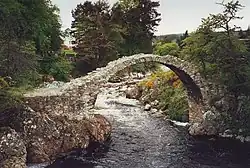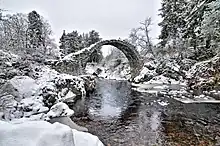Carrbridge Packhorse Bridge
Carrbridge Packhorse Bridge, also known as Coffin Bridge, is a bridge in the village of Carrbridge in the Highlands of Scotland. The bridge was built in 1717 to allow funeral processions to reach Duthil Church by crossing the River Dulnain. The parapets were washed away in the 19th century. In 1971 the bridge became a Category B listed building. It is now a popular tourist attraction.
Carrbridge Packhorse Bridge Coffin Bridge | |
|---|---|
 Packhorse Bridge at Carrbridge | |
| Coordinates | 57°17′1.8″N 3°48′57.0″W |
| Crosses | River Dulnain |
| Locale | Carrbridge village |
| Characteristics | |
| Design | Arch bridge high single span humpback |
| Material | Tooled rubble |
| Width | 2.14 m (7.0 ft) |
| Longest span | 12 m (39 ft) |
| No. of spans | 1 |
| History | |
| Designer | John Niccelsone |
| Construction end | 1717 |
| Designated | 5 October 1971 |
| Reference no. | LB241 |
| Location | |
History

The packhorse bridge was constructed to allow funerals to proceed across the River Dulnain to Duthil Church. Brigadier-General Alexander Grant commissioned the bridge. Stonemason John Niccelsone constructed the bridge at Lynne of Dalrachney and the £100 cost was paid for out of stipends of Duthil Church. The bridge was completed in 1717 and floods in the 1829 Muckle Spate washed away the guard rails.[1][2] The bridge also provided a way for tradesmen and locals to cross the river.[2] It is the Scottish Highlands' oldest known stone bridge.[3][4][5]
It was listed as a scheduled monument on 29 December 1958 and subsequently de-scheduled on 5 April 2016. The bridge became a Category B listed building on 5 October 1971.[6]
Description
The bridge at the village of Carrbridge is a popular tourist attraction and is located in the Cairngorms mountain area of Scotland. It has also been described as the coffin bridge.[2][5] All that exists today is a slender arch across the River Dulnain. The width of the bridge between the missing side rails is 2.14 m (7.0 ft).[1]
It is described in the Category B listing as a "High single span humpback rubble bridge; tooled rubble arch ring springing from natural rock abutment; neither surfacing nor parapet survive."[6]
Gallery
 Viewing area
Viewing area The bridge at dusk
The bridge at dusk.jpg.webp) The bridge in autumn
The bridge in autumn Old Packhorse Bridge plaque
Old Packhorse Bridge plaque
References
- "Carrbridge, Old Bridge". Canmore. Historic Environment Scotland. Archived from the original on 18 February 2023. Retrieved 18 February 2023.
- Rogers, Joseph (2019). Britain's greatest bridges. Stroud: Amberley Publishing. ISBN 9781445684420. Archived from the original on 3 March 2023. Retrieved 18 February 2023.
- Aiken, Gregor (7 August 2019). "Torrential rain causes flooding at the Highlands oldest stone bridge". Press and Journal. Archived from the original on 18 February 2023. Retrieved 18 February 2023.
- "13 of Scotland's most incredible bridges and viaducts". Scotsman. National World Publishing Ltd. Archived from the original on 18 February 2023. Retrieved 18 February 2023.
- Prince, Gemma (9 February 2023). "We've Found the UK's Most Impressive Bridges". MSN. Archived from the original on 18 February 2023. Retrieved 18 February 2023.
- "Old Bridge Over River Dulnain, Carrbridge". British Listed Buildings. Archived from the original on 18 February 2023. Retrieved 18 February 2023.